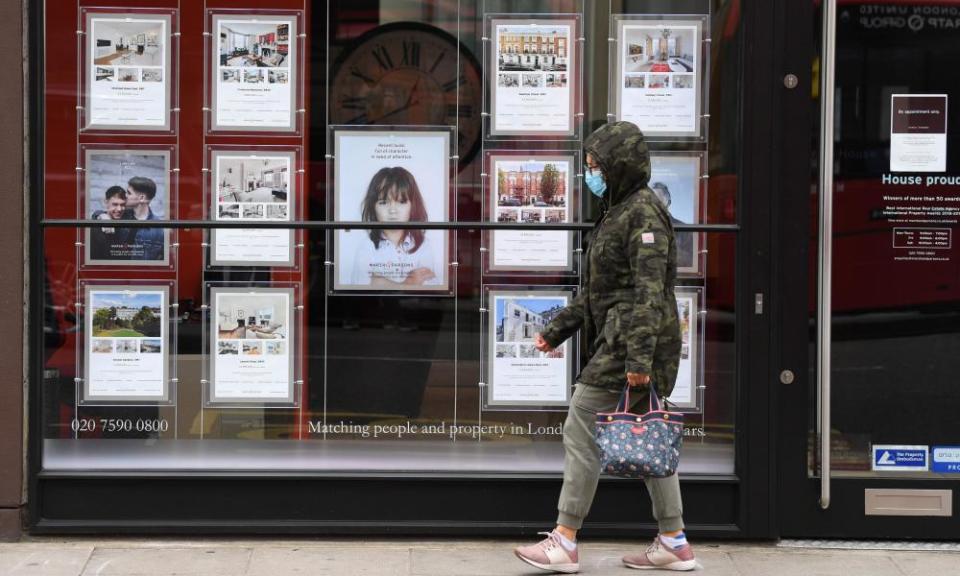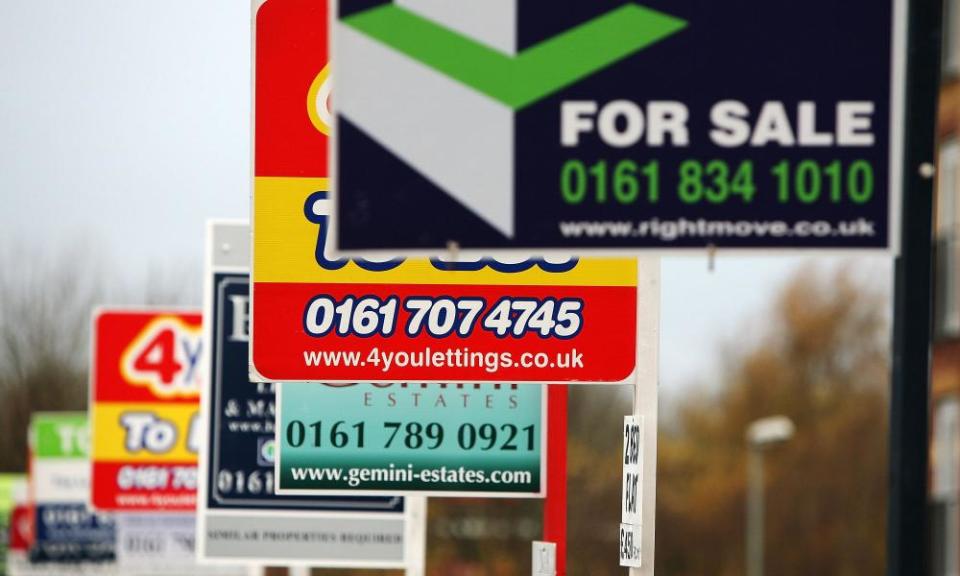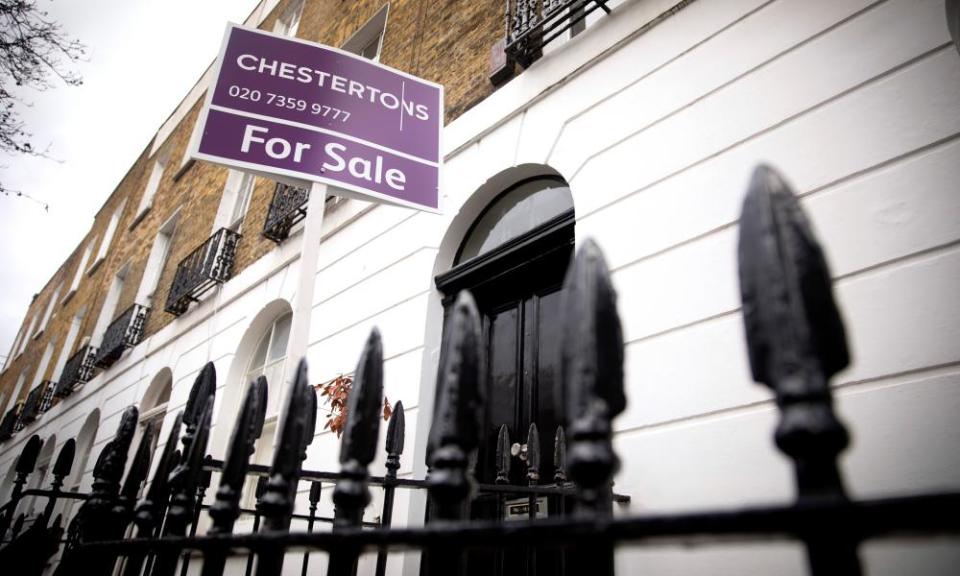UK property could cool sharply from six-year high, say lenders

The UK property market could cool rapidly in 2021, according to forecasters, as the stamp duty holiday ends and unemployment rises.
House prices rose to a six-year high at the end of 2020, according to Nationwide building society, rising 7.3% in the year, but the mortgage lender expects the market to slow “sharply” over the next few months.
The lender Halifax is expecting a fall in house prices of between 2% and 5% next year, while the Office for Budget Responsibility, the Treasury’s independent forecaster, is more pessimistic, predicting an 8% fall in prices in 2021.
The most bullish forecast is from the property listings website Rightmove, which expects prices to rise by 4% in 2021. But researchers at Savills are expecting the market will be flat across all parts of the UK next year before accelerating again in 2022.
Most other forecasters, including Zoopla, Knight Frank and Chestertons, are suggesting average prices will rise by 1% to 1.5%, signalling a slowdown compared with 2020.
Pent-up demand after the first national lockdown in March, plus the temporary stamp duty holiday that began in June, spurred a market recovery that took many observers aback. By September the market was steaming ahead at the fastest pace since 2016.
Nationwide said prices in December were a remarkable 5.3% above the level in March, when the Covid-19 pandemic struck the UK.
Robert Gardner, Nationwide’s chief economist, said: “The resilience seen in recent quarters seemed unlikely at the start of the pandemic. Indeed, housing market activity almost ground to a complete halt during the first lockdown as the wider economy shrank by an unprecedented 26%.”
But the stamp duty land tax (SDLT) cuts – which saved buyers in England and Northern Ireland £15,000 on a £500,000 home – will expire on 31 March 2021. A month later, the government’s furlough scheme is due to end.

Rightmove says there is a logjam of 650,000 properties changing hands, which is expected to keep the market busy in the first quarter of next year.
Separate stamp duty breaks in Scotland and Wales were less generous, cutting the tax on sales of up to £250,000. They are also set to finish at the end of March, and many expect the market to sag soon after that.
“Once the SDLT holiday concludes at the end of March, we anticipate a slowdown in sales completions as the impetus to move among buyers motivated by stamp duty savings dissipates,” said Richard Donnell, of the listings website Zoopla. He expects transactions to run 20-30% below normal levels once the stamp duty bonus falls away, leaving prices at the end of the year just 1% higher than the start.
The property firm Knight Frank takes a similar view and expects house price inflation to remain relatively subdued over the next few years, pencilling in gains of 1% in 2021 and 3% in 2022.

Savills reckons price rises will come to a halt next year, and there will be a rise of only 1% in the London area during 2022. “We do expect the economic effects of the pandemic to weigh more heavily on the housing market next year,” said Lucian Cook, the head of residential research at Savills.
He expects the bounceback to be strongest in the north-west of England. Price rises could accelerate to 6% in 2022, then 8% the year after. Savills’ five-year forecasts puts the north-west at the top of the table with a possible 27.3% gain and London at the bottom with a 12.7% gain.
The pandemic has changed the type of property sought by house-hunters. Nationwide said demand had increased for less densely populated locations and that detached properties had had greater price gains in recent quarters, while flats had underperformed.
As many Londoners moved out of the capital, the outer south-east region, which includes Brighton, Southampton and Oxford, recorded an 8% rise in prices in 2020, following a 1% decline in 2019.
Chestertons thinks prices will struggle in the capital next year. Nick Barnes, the head of research at the London agency, said: “Assuming no further major systemic shocks, we anticipate that the brunt of Covid’s impact on employment will be felt by the mainstream market and we forecast that after an exceptional year of growth in 2020, prices growth across the UK will slow to 1.5%. Greater London prices have risen less but are likely to fall more, and we expect them to drop by 2% by the end of the year.”

Halifax’s managing director, Russell Galley, said the unprecedented government support for workers had supported prices in 2020, but rising unemployment would be a factor in falling demand for homes.
However, he noted that the fall the bank predicts would only partially reverse the almost £18,000 increase in average prices recorded over the past 12 months.
“The key long-term issue for the housing market remains the inequality between generations and across the income spectrum, and specifically the ability of the young and lower-paid to access good quality housing that meets their needs,” he said. “The impact on the economy of Covid will therefore only increase the need to prioritise improved housing availability and affordability.”
A prominent feature of the UK property market is its ability to blindside those who expect a price crash. This time last year the forecasters were largely expecting a subdued 2020, with the “Boris bounce” wearing thin. No one, of course, anticipated the pandemic and the consequent collapse in economic output, and if they had, they would surely not have predicted big price gains over the year.
The uncertainty in the economy is now so great that the Royal Institution of Chartered Surveyors said it could not with any confidence issue a house price forecast.
Christian Cubitt, of Rics, said: “If 2020 has taught us anything, it’s ‘don’t make predictions!’ The only certainty we have going into 2021 is more uncertainty.”
Forecasts for UK house prices in 2021
Halifax: down 2%-5%
Rightmove: up 4%
Rics: no forecast
Savills: 0% change
Knight Frank: up 1%
Chestertons: up 1.5%
Zoopla: up 1%

 Yahoo Finance
Yahoo Finance 